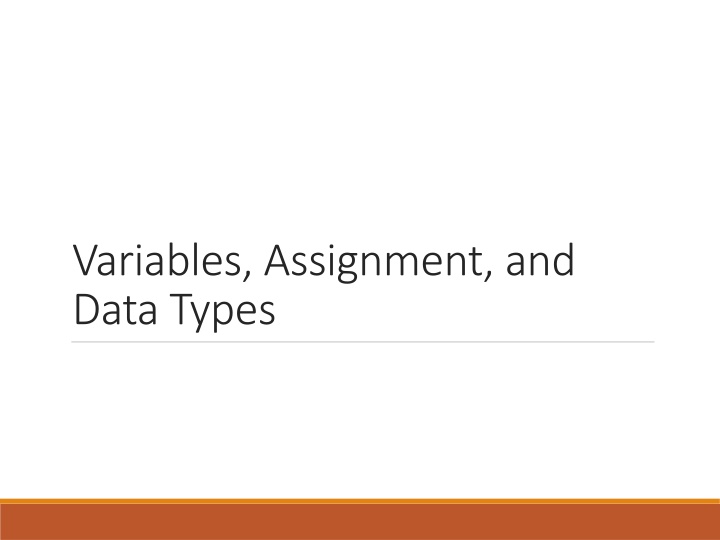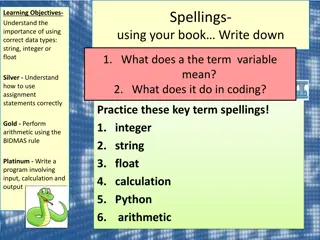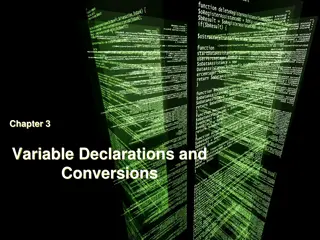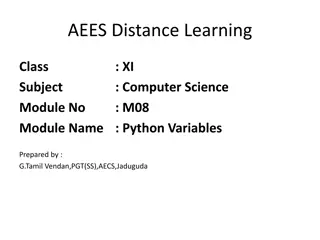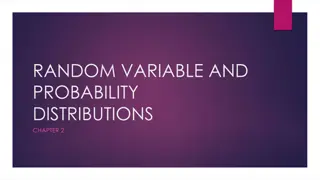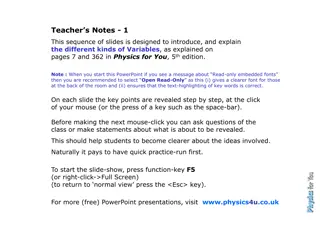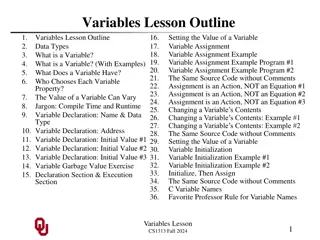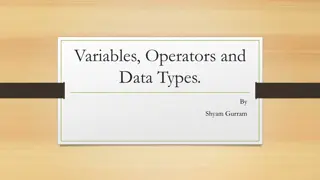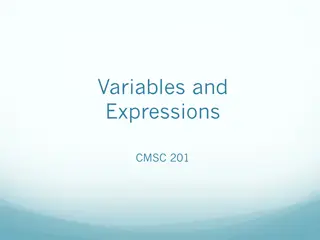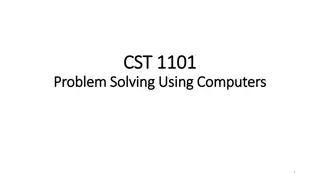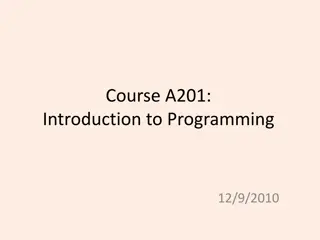Introduction to Variables, Assignment, and Data Types in C# Programming
Understanding variables, assignment, and data types is fundamental in programming. In C#, keywords play a crucial role in defining these elements. Learn about printing strings, pseudocode, escape sequences, and more through practical examples in C#.
Download Presentation

Please find below an Image/Link to download the presentation.
The content on the website is provided AS IS for your information and personal use only. It may not be sold, licensed, or shared on other websites without obtaining consent from the author.If you encounter any issues during the download, it is possible that the publisher has removed the file from their server.
You are allowed to download the files provided on this website for personal or commercial use, subject to the condition that they are used lawfully. All files are the property of their respective owners.
The content on the website is provided AS IS for your information and personal use only. It may not be sold, licensed, or shared on other websites without obtaining consent from the author.
E N D
Presentation Transcript
Variables, Assignment, and Data Types
C# Keywords (bad for variable names) abstract as base bool break byte case catch char checked class const continue decimal default delegate do double else enum event explicit extern false finally fixed float for foreach goto if implicit in int interface internal is lock long namespace new null object operator out override params private protected public readonly ref return sbyte sealed short sizeof stackalloc static string struct switch this throw true try typeof uint ulong unchecked unsafe ushort using var virtual void volatile while
Printing strings in C# (review) Console.WriteLine ( Whatever you are, be a good one. ); 1. Console represents the Operating System s console 2. WriteLine is a function to push data to the console
Pseudocode CLASS CountDown BEGIN METHOD Main() BEGIN s1 = "Three... " s2 = "Two... " s3 = "One... " s4 = "Zero... " PRINT(s1 + s2 + s3 + s4 + "Liftoff!") PRINTLINE() PRINT("Houston, we have a problem.") END Main END CountDown Output: Ps Three... Two... One... Zero... Liftoff! Houston, we have a problem.
C# using System; class CountDown { public static void Main(string[] args) { Console.Write("Three... "); Console.Write("Two... "); Console.Write("One... "); Console.Write("Zero... "); Console.WriteLine("Liftoff!"); //on first line Console.WriteLine("Houston, we have a problem. "); } } Output: Three... Two... One... Zero... Liftoff! Houston, we have a problem.
Escape Sequences Printing and escape sequence prints a special character in an output string. Common escape sequences: \b backspace. (e.g B\bsecz\bret prints what?) \t tab \n newline \r carriage return \ double quote \ single quote \\ backslash
C# // Escape sequences class Roses { public static void Main(string [] args) { Console.WriteLine("Roses are red,\n\tViolets are blue,\n" + "Sugar is sweet,\n\tBut I have " + "\"commitment issues\",\n\t" + "So I'd rather just be friends\n\t" + "At this point in our relationship."); } }
Pseudocode // Prints the number of keys on a piano. CLASS PianoKeys BEGIN METHOD Main() BEGIN keys = 88 PRINT("A piano has " + keys + " keys.") END Main END PianoKeys Ps Output: A piano has 88 keys.
C# // Prints the number of keys on a piano using System; class PianoKeys { public static void Main (string[] args) { int keys = 88; //declare and initialize Console.WriteLine("A piano has " + keys + " keys."); } } Output: A piano has 88 keys.
Pseudocode // Print the number of sides of several geometric shapes. CLASS Geometry BEGIN METHOD Main() BEGIN sides = 7 PRINT("A heptagon has " + sides + " sides.") sides = 10 PRINT("A decagon has " + sides + " sides.") sides = 12 PRINT("A dodecagon has " + sides + " sides.") END Main END Geometry Output: A heptagon has 7 sides. A decagon has 10 sides. A dodecagon has 12 sides. Ps
C# // Print the number of sides of several geometric shapes. using System; class Geometry { public static void Main (string[] args) { int sides = 7; // declare and initialize Console.WriteLine("A heptagon has " + sides + " sides."); sides = 10; // assignment statement Console.WriteLine("A decagon has " + sides + " sides."); sides = 12; // assignment statement Console.WriteLine("A dodecagon has " + sides + " sides."); } }
Constants Use all CAPITAL LETTERS for constants and separate words with an underscore: Pseudocode: CREATE TAX_RATE = .05; C# : const double TAX_RATE = .05; Declare constants at the top of the program
Example in C# Example in C# using System; class Example { public static void Main (string[] args) { string myStr = "Whats up, Doc?"; Console.WriteLine (myStr.Length); // 14 Console.WriteLine (myStr.Equals("Hello")); // False Console.WriteLine (myStr.IndexOf('s')); // 4 Console.WriteLine (myStr.Substring(2, 7)); // ats up, } }
